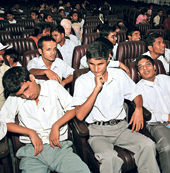 |
| Visually challenged students at the special screening of Black. Picture by Bishwarup Dutta |
A special screening of Sanjay Leela Bhansali’s Black engaged a bunch of visually challenged students in the story of young Michelle McNally and her ageing teacher on a rain-soaked Wednesday afternoon last week.
Around 200 students from various schools, including Blind Boys’ Academy, Lighthouse for the Blind, Voice of the World and National Association for the Blind, turned up for the show, specially scripted for them, at Vidya Mandir.
A running audio commentary with voiceover by actress Sushma Seth brought alive the silent moments — actions, movements, costumes and changing backdrops — of the Amitabh Bachchan-Rani Mukerji-starrer that deals with protagonist Michelle’s struggle to overcome her sight, hearing and visual disabilities.
The screening was held as part of the bicentenary celebrations of Louis Braille’s birthday. It was hosted by the National Association of Blind (NAB) in association with Calcutta Round Table 4 and Calcutta Park Street Round Table 34.
“Four years ago, we had screened Munnabhai MBBS using this special technology for our blind students. After Black, we would also like to show them Fanaa and Taare Zameen Par as these films portray disability in a more humane way,” said Kanchan Gaba, the secretary of the association’s West Bengal branch who had lost her sight when she was in Class III.
But many of the students weren’t watching Black for the first time. “I have seen Black before but this time I could understand the situations much better. The voice describing the background and expression on each character’s face really helped,” said 25-year-old Amal Sardar from NAB.
As part of the ongoing celebrations, 11 visually challenged students were chosen for a trekking trip, while few others took part in a braille reading and writing competition at St Xavier’s College. “We have started the Louis Braille Memorial Scholarship that will be awarded to 100 poor students based on their merit,” said Gaba.
Say no to drugs
What should you do when a close friend or sibling does drugs? Talk him out of it or take him to a counsellor? The concerns were many as several students, teachers and anxious parents got together at Oxford Bookstore on Thursday evening to attend a discussion on how to counter the social menace. June 26 was International Day against Drug Abuse and Illicit Trafficking.
The panelists included educationist Bijli Mullick, superintendent of the narcotics control bureau D.K. Ghosh and clinical psychologist Rajyasree Bandyopadhyay. Mayor Bikash Ranjan Bhattacharyya was the chief guest. The audience comprised students of La Martiniere for Boys’ and teachers of Shri Shikshayatan and Ballygunge Shiksha Sadan.
Clinical psychologist Bandyopadhyay came forward with possible steps to counter the growing trend of drug abuse among the youth. “An addict goes through five stages — experimental, moderate, abuse, dependent and death. Psychological help is more important than rehabs that detoxify the body,” said Bandyopadhyay.
Superintendent Ghosh, who has conducted raids on drug dens, stressed the need to restrict the supply of drugs. “Calcutta does not have cocaine addicts because it is not available in this region but heroin addiction is a cause for concern. Poppy plantations and chemical precursors to make opium and heroin need to be destroyed,” said Ghosh.










